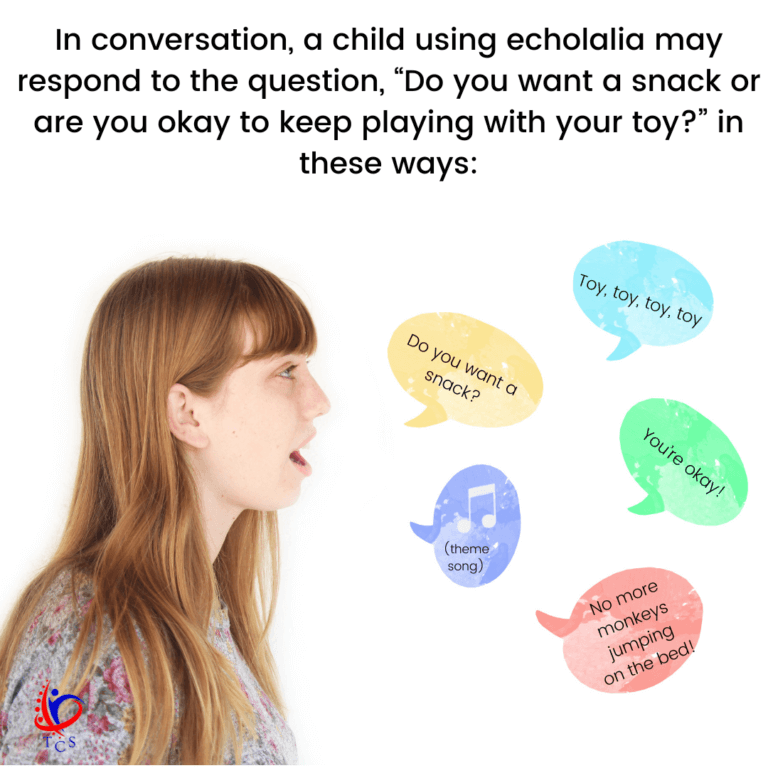Echolalia is when a child repeats words or phrases spoken by others. It is common in neurodivergent children. But, what does it mean about their language development? How can we best support them? In this post, we’ll explore how echolalia serves children who are gestalt language processors and discuss ways in which parents can support and celebrate their child’s unique communication style.
What is echolalia?
There are two main types of echolalia. Immediate echolalia means that the repetition occurs immediately after hearing the phrase (for example, repeating a question back to the person who asked it). Delayed echolalia, on the other hand, means that the child will keep it in their mind for a period of time and say it later. They could repeat words from another person, a TV show, or a song. Some children repeat only a few phrases often, while others have lots of phrases they remember and repeat.

What is gestalt language processing and how does it relate to Echolalia?
Echolalia can be an indicator that a child is a gestalt language processor. Gestalt language processing is a fascinating form of language development that highlights one aspect of how neurodiversity and language intersect.
Gestalt language processing is a unique approach to how some children understand and acquire language. Rather than breaking down language into individual words, gestalt language processors perceive and process it as larger, holistic units. This means they grasp the overall meaning of what they hear and rely on repeating these complete “gestalts” to express themselves. In this context, echolalia isn’t just repetition but a meaningful expression of this cognitive style.
While gestalt language processing might seem unfamiliar compared to the more common analytic language development, it’s a valid way for children to learn language, though less common. It follows distinct stages similar to typical language development, leading to the ability to produce self-generated language. Initially, children who are gestalt language processors begin with echolalia, then progress to mixing and matching familiar phrases. As they develop, they gradually break these phrases down into single words before combining them to form their own phrases and sentences. Some children may need support to navigate through these stages effectively.
How to Support Children who Communicate with Echolalia
Celebrate Communication in All Its Forms. Embrace the diversity of communication styles and recognize that each child’s communication is unique and valuable. Celebrate every attempt at communication, whether through words, gestures, or echolalia, as a meaningful expression of their thoughts and feelings.
Observe and Listen. Pay close attention to the context in which echolalia occurs. Is the child using it to express a need, convey emotions, or engage in social interactions? Understanding the function of echolalia can provide insights into the child’s communicative intent.
Investigate. Sometimes the meaning of a child’s echolalic phrase may not be obvious. In these cases, try to figure out where the phrases the child is repeating came from, as they may have heard them long ago or from a TV show or movie. Then, use the context to help you figure out what the child means by the phrase.
Respond Appropriately. Respond to echolalia with patience and validation. Acknowledge the child’s communication attempts and respond to the underlying message rather than focusing solely on the repeated words or phrases.
Create a Supportive Environment. Foster an environment of acceptance and understanding where children feel safe to communicate in their own way. Encourage family members, educators, and peers to embrace and celebrate the richness of communication in all its forms.
Seek Professional Guidance. Consult with a speech-language pathologist experienced in working with children who are gestalt language processors. They can provide valuable insights and strategies tailored to your child’s specific needs and abilities.
For many parents, echolalia can be perplexing and even concerning. However, it’s important to recognize that echolalia can serve a communicative purpose for children who are gestalt language processors. For parents, understanding and embracing echolalia can be a transformative journey and help foster connection and understanding of their child and their way of seeing the world.
